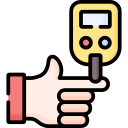- Given any time of day
- Check BNF - some require dose reduction in acute kidney injury
- Withhold if vomiting
test announcement

** Please note there is a global shortage of GLP-1 agonist medication until mid 2024 **
If a patient brings in their own supply, these can be given but it is possible the hospital will struggle to supply these medications in the longer term
An alternative medication may need to be considered if control is poor